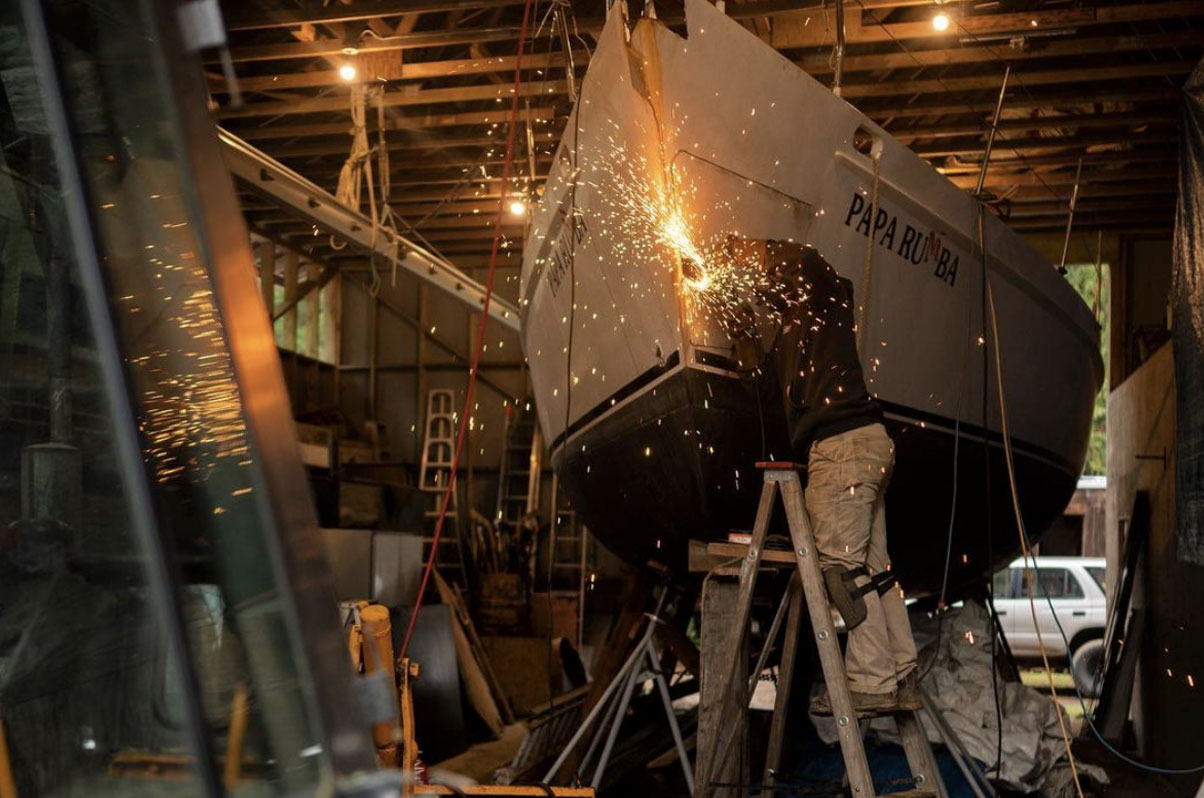
If you’re here, reading this right now, I’m sure you’ve heard the old saying that the word BOAT stands for Bring Out Another Thousand. Now I wish I was here to argue with that statement and tell you that there is some magical work around that everyone else is missing to make boating more affordable, but really, regardless of how you do things, having a boat is not a cheap endeavour. You can cut corners to purchase cheaper materials, but in a marine environment they break down quickly and you will end up spending that money again, probably sooner than later. Logan and I unfortunately know this from more experience than we would want as we work our way through our second boat refit. But there are some things you can do in order to minimize costs and frustrations in the long run, whether you are doing projects yourself or hiring someone else to do them.
Here are eight tips we have found to work and minimize both stress and strain on our bank account.
- DIY doesn’t necessarily mean cheaper.
If you are capable of doing projects yourself, you can potentially save quite a bit of money. However, lots of time is needed to learn the skills to properly do many boat jobs, and for many, money is time, so there is also that trade-off. If you aren’t already equipped with the skills needed for a job then there is also always the potential that you end up taking on a job you don’t have the skillset for and in the end have to pay a professional to do it on top of the money, time and energy you put into it yourself. But if you have the time and skills to do the job yourself, it can be a great way to save money. - Do your research and figure out what is going to work best for your boat and sailing style.
Your hull type, boat size, where you are located and where you are planning to sail can all determine which products will be best for you, whether you are searching for electronics or paint. Talking to people who have experience with the jobs you are doing, speaking to product reps and doing some reading online can save you a lot of time, money and heartache in the long run. - Buy the marine grade stuff.
There is the occasional material where it makes sense to buy regular materials, but for the most part things are made marine for a reason- because of how different the marine environment is- and buying the proper grade, of, say stainless steel bolts can mean the difference between your hard work lasting a year or 10 years. - Budget at least twice (safer to say three times) as much time as you expect to need.
Because here’s the thing: it is very rare that a boat project or problem exists as an isolated issues, or goes off without having unexpected issues and setbacks. It almost always takes you longer than you expected or hoped. Even when things go as planned, boat spaces are small and difficult to maneuver in and doing a job on a boat will take longer than doing it on land. - Budget at least twice as much money as you expect to need.
Similar to the point above, chances are you will need more bits and bobs than you expected and you will probably have to replace more things than you wanted to, plus, you know, the price of extra days in the boat yard. - Don’t cut corners.
Do things the proper way with proper marine fittings, materials, process steps, and things will last a lot longer, fuction better and keep you out of danger. And I know this is commonly a difficult one, especially with complicated, uncomfortable, long lasting boat projects… but it makes a huge difference. - Don’t be afraid to talk to other people with experience- numerous other people.
If you talk to 10 different people with boat project experience, chances are you will get at least 10 different opinions on how to do a job, but having those conversations may lead you to exactly what you were needing without even realizing it. Just makes sure you also do your own research after having those chats. Talk to people at the boat yard, on the dock, at the marine stores or product reps. Listen to the different experiences and figure out what applies to you and what doesn’t. - Really ask yourself if second hand is going to be worth it.
So here’s the thing- I’m very much a buy as much second hand as I can type of person, but with how quickly marine products degrade, it can really be a headache saver to ask yourself if it’s worth it to buy the thing used or if you should go for new. If you’re only weekend sailing for instance, it will probably be worth it to buy your foul weather gear second hand, but if you’re sailing every day in rainy or cold conditions, it’s probably worth it to shell out the extra cash for new. Same with electronics. Some electronics still work amazingly years later, while others are very outdated. Determining which category you fall into can make all the difference.
None of us who live on or use boats can escape needing to do work on them, but boat projects can really make or break an experience with a boat. We hope that these tips help to make your future projects move forward a little bit more smoothly.
By Wayward Life
- Website: https://www.the-wayward-life.com/
- Instagram: http://instagram.com/the.wayward.life
- Facebook: http://www.facebook.com/thewaywardlife
- Youtube: https://www.youtube.com/waywardlifesailing
